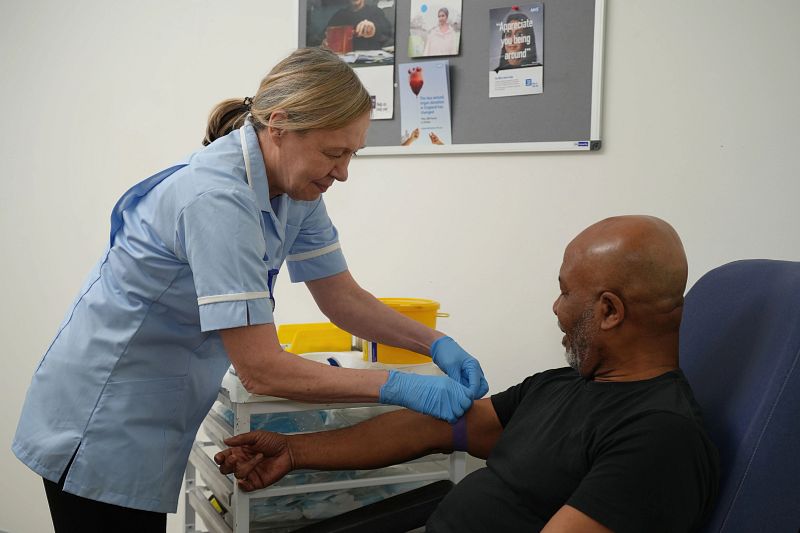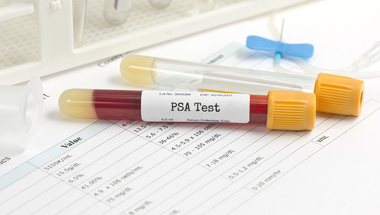Research
14 Oct 2024Diagnosing prostate cancer is safer than ever before – so why can’t GPs offer men a PSA blood test?
The way we diagnose prostate cancer has come on leaps and bounds over the last 10 years. MRI scanning and innovative biopsies have made testing safer and more accurate. But GPs still can’t offer a PSA test to men most at risk.

The way we diagnose prostate cancer is now safer and more effective than ever before – and it’s thanks to your support of our research and campaigning.
Our analysis shows that the introduction of new technologies, like MRI scanning and state-of-the-art biopsy methods, have dramatically reduced the chances of men being harmed by the diagnostic process.
This includes a staggering 90 per cent fall in the proportion of men experiencing the most serious harm – sepsis – and a 79 per cent drop in the proportion of men who have an unnecessary biopsy.
This translates to more than 100,000 men avoiding harm every year when being tested for prostate cancer.
That’s why we’re calling on the UK government to overhaul outdated NHS guidelines on diagnosing prostate cancer, to allow GPs to speak proactively to men who are most at risk of the disease about their right to a free PSA blood test.

Guidelines prevent men getting the information they need
The earlier you find prostate cancer, the easier it is to treat.
But right now, NHS guidelines stop GPs from bringing up PSA blood testing with the men who are most likely to get prostate cancer – including Black men and men with a family history of the disease.
Instead, it’s each man’s responsibility to find out his risk and ask for a test himself.
This is a hangover from the previous system, when men with a raised PSA level were sent straight for a transrectal biopsy, which could cause pain and bleeding, and came with a risk of serious infection. These biopsies were also less accurate and could miss the cancer, leading to repeated biopsies with further risks of infection and uncomfortable side-effects.
All of this meant that there were significant drawbacks to GPs routinely offering PSA testing. However, the system has changed considerably in the last few years.

For example, we helped to fund research that showed having mpMRI scans beforehand could safely rule out many biopsies as unnecessary.
The scans also improved the accuracy of those biopsies that were needed, making them more likely to detect the cancer the first time.
Given these benefits, we then worked closely with the NHS to make sure the innovative technique was rolled out across the country.
Meanwhile, we have supported several hospitals to move over to transperineal biopsies, which have a lower risk of infection.
Our new research shows that these techniques have drastically reduced the risk of these harms, and that diagnosing prostate cancer has never been safer and more accurate.
Current approach is driving late diagnosis of prostate cancer
Dr Matthew Hobbs, our Director of Research, said: “Current guidelines mean it’s up to men to ask about a PSA blood test. That practice is undoubtedly driving late diagnosis of prostate cancer and massive inequality across the UK.
“Historically, the evidence that PSA testing saved lives was weak and there was strong evidence that testing caused harm. Now, the situation has changed. We have strong evidence from two separate trials that PSA testing does reduce the number of men who die from prostate cancer, and this latest research shows that modern techniques already being used as standard across the NHS have massively reduced the number of men who suffer harm.
“Guidelines must catch up to the modern evidence so that GPs are able to proactively raise the issue of prostate cancer with men at higher risk.”
I could rest easy knowing that my son would be spoken to by a doctor, and that any cancer would more likely be found early and dealt with.
Allan Roper, 70, was diagnosed with prostate cancer in 2021. With a history of prostate cancer in his family he knew he was more likely to get the disease. He's gone through successful treatment now, but he worries about his son who's also at higher risk.
He said: “My son, Adrian, is in his forties now, and because I've had it, I know that he's at risk of getting it too. I'm always reminding him to talk to his doctor about prostate cancer.
“For me, having the guidelines change so that GPs can start discussing prostate cancer testing with men like me and my son would be a huge step in the right direction. It would mean I wouldn’t worry so much about him having to start those conversations himself.
“I could rest easy knowing that he would be spoken to by a doctor, and that any cancer would more likely be found early and dealt with.”
Nick Burns-Cox, urologist and co-author of the paper, said: “This is a really important piece of research, because it measures the real experiences of patients treated in NHS hospitals, and makes a strong case for updating UK guidelines.
“It is also fantastic news for men and their families as it shows how dramatically harm has fallen in the ways we diagnose prostate cancer, even compared to just a few years ago.
“This means thousands of men avoiding unnecessary, invasive tests and spared the worry of an unnecessary diagnosis.”
New evidence has changed the game. Now we have to change the system.
Now that we have this game-changing evidence, we're calling for the government to take immediate action by updating NHS guidelines – so that GPs can start discussing prostate cancer testing with men at risk right now.
Thousands of people already backed our campaign to get our message to MPs.
Will you join them and back our call for action?
Questions about prostate cancer risk?
Our new Risk Information Service is a free, confidential telephone service that connects you with a trained Risk Information Officer, who can answer your questions and provide support on prostate cancer risk and the PSA test.
We know this can be a confusing topic, so we're here to help.







